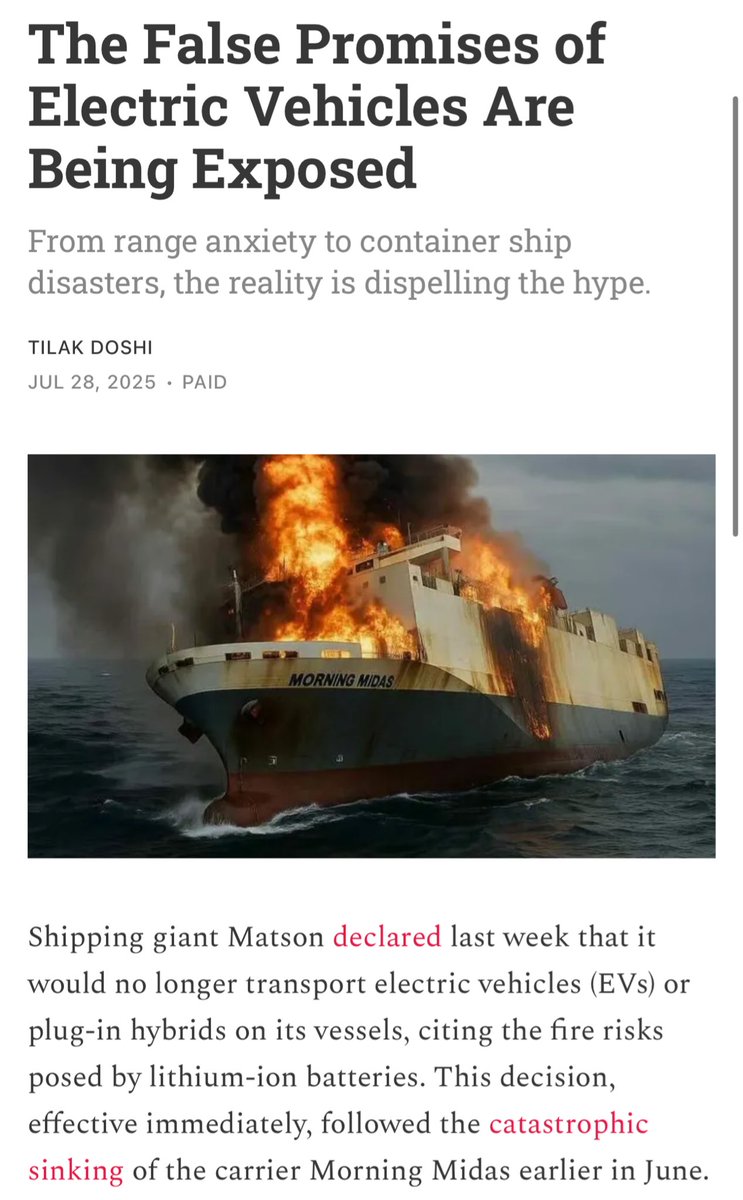They won’t tell you this on the evening news—but some of the world’s largest cargo companies are now flat-out refusing to transport electric vehicles. Why? One chilling reason: the extreme fire hazard posed by lithium-ion batteries.
For years, EVs were paraded as the sleek saviors of the climate crisis. Polished ads. Green incentives. Politicians gushing about a “sustainable future.” But behind the curtain, something far more volatile is sparking fear—literally.
Lithium-ion batteries, the heart and soul of electric cars, have a nasty little secret. When they burn, they really burn—hotter, longer, and far more viciously than your average engine fire. It’s not just smoke and scorched metal; it’s toxic gas, uncontrollable flames, and sometimes, spontaneous combustion. One spark can turn a cargo deck into a floating inferno. And these fires? They’re damn near impossible to put out.
Shipping giants are catching on. And they’re quietly pulling the plug.
Some cargo companies have already implemented outright bans. Others are tiptoeing around the issue, layering on so many restrictions that transporting EVs is basically off the table. Insurance costs are ballooning. Fireproof containers are being debated. Risk assessments are now red-flagging EV shipments. And still… silence from the EV pushers.
Let that settle in. The very companies paid to move goods across the planet—no strangers to danger—are saying “No thanks” to electric cars. Not oil tankers. Not munitions. Electric. Cars.
Ask yourself: if these logistical titans—the ones who routinely haul hazardous materials across oceans—are suddenly backing away from EVs, what does that say about the real risk? What aren’t we being told?
The narrative of “clean and safe” is cracking. Under the glossy surface of the green revolution lies something far more combustible. We’ve been sold the future… but at what cost?
And when the next container ship goes up in flames, who will be held accountable?











no worries, zero carbon footprint, electric vehicle production is 4 times more toxic than internal combustion, rare earth and toxic clouds are not an issue either, since you have a license plate that says green vehicle, you can do anything, it is even better than a Canadian passport, zero carbon footprint, holier than thou, the chosen one centre of the universe, you are all that, enough to want us to paint our vehicles green….
easy to weaponize an electric car, a bomb or fireball on wheels, easy to hack, control, assassinate, demolish infrastructure, shipping and buildings, how cool is that? The Tesla cars in the movie, Leave the world behind, had cryptic in your face messages, don’t watch the movie, spare yourself from the 4 sound tracks of acoustic weaponry by americas public enemy…
the only way around that is local or regional battery production, send empty cars…
did anyone do the math on the fuel that was duped into the ocean or how much went up in smoke? didn’t think so, there is not carbon foot print in the ocean, unless you can walk on water or a white supremacist world class inventor, right? they are privileged and have a monopoly, they skip the lawyers and zap things from space, not to worry, it’s all in the wording.
What about the advanced fuel systems you write about?
Weird how the many battery plants and big money invested in Canada generated zilch products or investment returns, what does that tell you? the only thing better at money laundering than casinos is battery plants….
“duped” yes “duped” everyone is duped, of course some of the fuel was not really dumped into the ocean either, it had no choice. You should do an article on how people are duped! Kind of like the recent one on politics and government, people are duped, elections Canada, duped, leader speeches, duped…
of course, nobody talks about all the lead in jetful, the majority of the fuel, not automobiles that suffered from the unleaded regulations, or the lead in Chinese candles, that’s great
now if an internal combustion engine automobile would catch fire and burn, that would be an outrage, but to criticize an electric vehicle, what blasphemy, the unpardonable sin, paramount to being anti-semitic or something, hate speech, you old fossil fuel lower, you colonialist settlor land thief, how dare you!
Contrast that with being complimented as one of the most brilliant combustion thermo-physics genius of all time, thanks for the 200 MPG, that’s great, independence, zero computers, zero weaponized automobiles, zero cars that spy and track everything about you, something easy to understand and fix if you needed too, you don’t even have to lie with computers about how great it is…zero EMF, Zero microwave wifi blue tooth corrupting your DNA, energy and vitality…yes, you could write about all that too, lots of people have, maybe link some resources, why drive in a microwave on wheels, why zap your babies with ultrasound, or the endless assault with cell phones on your reproductive capabilities, or suffering from cognitive decline super imposed by zombie technology, electric cars do all that and more, the genocide kill box on wheels…oh sorry, I guess that was classified, only opinion-canada.ca allows free speech, so thanks, people need to know, right?
do you or can you have guest writers?